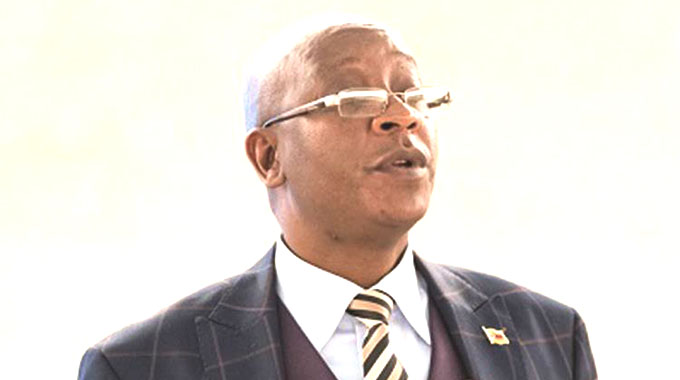Majority wants death penalty abolished

Zvamaida Murwira Senior Reporter
The Bill to abolish the death penalty was informed by a nationwide survey carried out by the Ministry of Justice, Legal and Parliamentary Affairs and development partners in April this year, which showed that the majority of people no longer want capital punishment in the country’s legal statutes.
The present Constitution in 2013 marked the half-way point, limiting the potential use of the death penalty to aggravated murder by adult males under the age of 70, although there have been no executions since 2005.
The Swiss Embassy and the Centre for Applied Legal Research assisted the Ministry in conducting a nationwide survey covering all the 10 provinces with three districts being randomly selected in each province.
After the survey concluded that the majority abhor the death penalty, a private members’ Bill has since been gazetted that seeks to abolish the death penalty.
The Bill will now be tabled before Parliament for debate and is expected to pass with or without amendments.
A private member’s Bill is brought to the House by an MP who is not a Vice President, Cabinet Minister or Deputy Minister and can deal with a variety of issues like family law, contracts, control of animals, but it cannot impose or alter taxes or impose financial obligations on the State.
It is a Bill “for the particular interest or benefit of any person or persons or bodies of persons as distinguished from a measure in the general public interest”.
In an interview yesterday, Justice, Legal and Parliamentary Affairs Minister Ziyambi Ziyambi said while the Bill was being sponsored by Dzivaresekwa MP Mr Edwin Mushoriwa, the Justice Ministry had no reservations on it given what came out from the national survey.
“Indeed the Bill has been brought to Parliament by a private member. In principle we have no problem with the Bill as a Government. When it comes for debate, we will just ensure that it speaks to what we believe in as a Government,” he said.
“It should capture what we believe as a Government and particularly observations and recommendations that were carried out by a survey we commissioned this year.”
Commenting on the Bill, Mr Mushoriwa said he was motivated not only by the survey, but an observation that the poor were being sent to the gallows for failure to hire lawyers to articulate their case in court.
“I was further motivated to push for this Bill after noting that, only the poor who cannot afford competent lawyers end up on death row and given the moratorium on executions in Zimbabwe for the past 17 years I noted the mental anguish for those on death row and it’s most pronounced on their relatives,” he said. “Death sentence was never part of our culture, but was bought by colonialism. Our great heroine Mbuya Nehanda and other heroes of Chimurenga wars were hanged for fighting for our freedom. If Mbuya Nehanda was to wake up today she would be shocked that we are still having this colonial law in our statutes. Death sentence is state murder. An eye for an eye can not build Zimbabwe.”
According to a summary of the report, the consultations were taken in all the provinces.
“The purpose of the consultations was to obtain people’s views on the death penalty question to enable the Ministry to develop a position on whether or not to recommend the abolition of the death penalty in Zimbabwe,” reads the reports.
The consultations revolved around six questions such as whether one has heard about death penalty, whether one feels it deterred crime of murder, whether one would recommend it if he or she loses a close relative from crime of murder.
Other questions were whether death penalty provided satisfaction to aggrieved relatives and if abolished what alternative sentence should be imposed.
“The response to these questions revealed that there are basically two broad views to the death penalty question, those respondents who would want death penalty to be retained and those who would want it abolished. This probably reflects the contentiousness and complexity of the subject matter,” reads the report.
The report said the reasons for respondents that want death penalty abolished argued that it was ineffective as a penal sanction, went against sanctity of life, did not cope with imperfection of the criminal justice system and was a human rights violation.
“The death penalty question is a very emotive topic. This is particularly so when it is discussed within a national context where there is an increase in reported cases of murder.
“While this has an important effect of making the topic relevant to the lived realities of the people in their various communities, it also has a negative effect of facilitating emotive responses on a matter that would otherwise require a balanced assessment of the issues/arguments at hand,” read the report.
The Bill, gazetted last week, does not just want to block future sentences of death, but proposes that all those now on death row must be brought before the High Court for re-sentencing.
While life imprisonment might be the maximum, the High Court will have discretion for sentence as it has in other crimes, and will be able to take into account all the factors in aggravation and mitigation.
Once re-sentenced, the same convicts will have the right to appeal to the Supreme Court should they be aggrieved with the new sentence, if the Bill becomes law.
Since 2013, the Constitution protects the right to life, but states that Parliament may pass a law that permits a court, in limited circumstances, to impose the death penalty on men convicted of aggravated murder.
The Bill simply wants Parliament not to pass such a law.








Comments